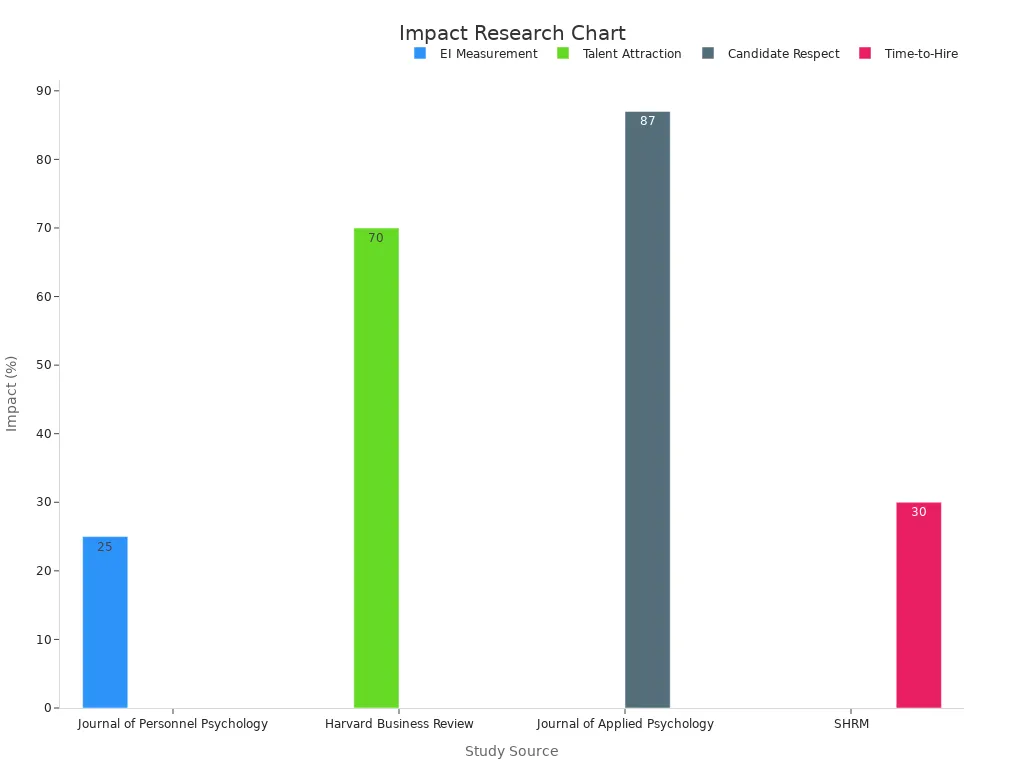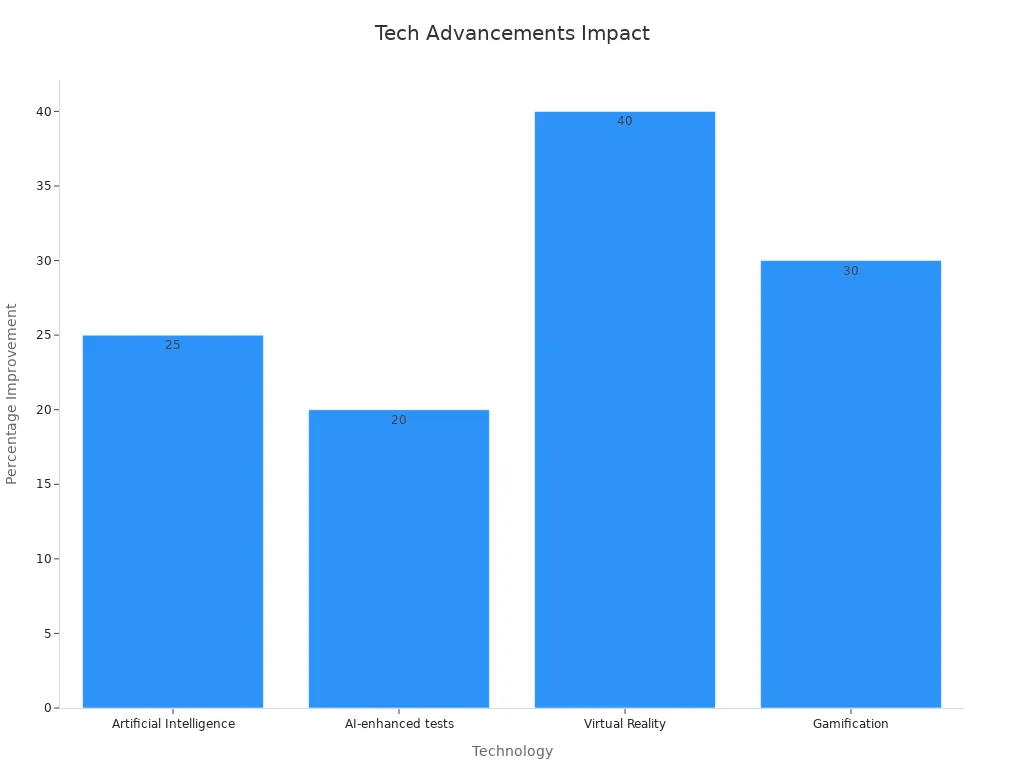How Psychology Shapes Candidate Experience in Modern Recruitment

Psychology plays a critical role in shaping how you experience recruitment, which is why understanding 'The Psychology of Candidate Experience: What Matters Most?' is essential. It influences your emotions, perceptions, and decisions throughout the hiring process. For example, research shows that 73% of candidates feel significant anxiety during high-stakes assessments, which can reduce performance by up to 20%. Personalized communication also makes a difference. Studies reveal that candidates who receive tailored messages are 2.5 times more likely to view the hiring process positively. These insights highlight why understanding the psychology of candidate experience matters most for creating fair and engaging recruitment journeys.
Key Takeaways
Knowing how candidates feel about the process is important. It affects their opinions and choices about the job.
Being fair and honest builds trust. Clear messages and fair rules make candidates happier and more involved.
Fixing mental shortcuts helps with better hiring. Using the same questions and hiding names on resumes can make it fair.
Caring in talks builds good connections. Listening well and making talks personal show candidates they matter.
Using tech makes hiring better. Tools like AI and VR make the process fairer and more exciting for candidates.
The Psychology of Candidate Experience: What Matters Most?

Defining Candidate Experience
Candidate experience refers to how individuals perceive and interact with every stage of the recruitment process. It includes everything from the initial job posting to the final offer or rejection. A positive experience ensures candidates feel valued and respected, regardless of the outcome. Metrics like Net Promoter Score (NPS) and Candidate Satisfaction Score (CSAT) help measure this experience. For instance, NPS evaluates how likely candidates are to recommend your company, while CSAT gauges their overall satisfaction. These metrics highlight the importance of creating a seamless and engaging hiring journey.
Why Candidate Experience Is Crucial for Recruitment Success
A strong candidate experience directly impacts recruitment outcomes. Research shows that organizations with excellent candidate experiences are twice as likely to attract top talent. Moreover, 76% of candidates with a positive experience would recommend the company to others. This not only enhances employer branding but also increases offer acceptance rates. On the other hand, 52% of candidates decline job offers due to poor hiring processes. By prioritizing candidate experience, you can improve employee retention, reduce turnover costs, and build a more engaged workforce.
Psychological Factors That Shape Candidate Perceptions
Several psychological factors influence how candidates perceive the recruitment process. Fairness plays a significant role. Candidates who feel respected and treated fairly are 87% more likely to accept job offers. Transparency also matters. Clear communication about timelines and expectations builds trust and reduces anxiety. Emotional intelligence (EI) is another key factor. Recruiters with high EI create a positive impression, leading to higher engagement and job acceptance rates. According to the Journal of Personnel Psychology, organizations using EI-focused strategies see a 25% reduction in negative candidate experiences.

These psychological insights emphasize the importance of designing recruitment processes that prioritize empathy, fairness, and transparency.
Psychological Principles That Impact Recruitment
Fairness and Equity in Recruitment Processes
Fairness and equity are essential in recruitment. You want to feel that the process gives everyone an equal chance, regardless of background, race, or gender. Standardizing recruitment practices ensures inclusivity and fosters a positive company culture. For example:
Structured interviews reduce bias by focusing on consistent criteria.
Reflecting on hiring decisions helps recruiters avoid emotional biases.
When fairness is prioritized, workplaces become more diverse and inclusive. This approach not only benefits candidates but also strengthens organizational success.
Transparency and Building Trust
Transparency builds trust between you and the organization. Clear communication about scoring criteria and evaluation methods helps you understand how decisions are made. For instance:
Transparent scoring systems use standardized metrics, making comparisons fair and objective.
Sharing timelines and assessment methods keeps you informed and reduces uncertainty.
Prompt feedback also plays a significant role. Most candidates appreciate receiving insights after interviews, which enhances their overall experience. Additionally, respecting your privacy during the recruitment process demonstrates ethical practices and fosters trust.
Communication Strategies That Enhance Candidate Engagement
Effective communication keeps you engaged throughout the hiring process. Organizations that prioritize timely and clear communication often see better outcomes. For example:
Statistic | Description |
|---|---|
48% of candidates ask for interview timing well in advance | Transparency in scheduling allows better preparation. |
52% maintain relationships with companies providing feedback | Feedback encourages ongoing engagement. |
By addressing your concerns and providing regular updates, recruiters create a positive impression. This strategy not only improves your experience but also strengthens the organization’s reputation.
Addressing Cognitive Biases in Recruitment
Cognitive biases can significantly impact recruitment decisions, often without you realizing it. These mental shortcuts influence how you perceive candidates, sometimes leading to unfair or inaccurate judgments. By understanding and addressing these biases, you can create a more equitable and effective hiring process.
Common Cognitive Biases in Recruitment
Here are some biases that frequently occur during hiring:
Affinity Bias: You may favor candidates who share similar interests, backgrounds, or experiences as you.
Confirmation Bias: You might focus on information that supports your initial impression of a candidate while ignoring contradictory evidence.
Halo Effect: A single positive trait, like attending a prestigious university, may overshadow other important factors.
Stereotyping: Assumptions based on a candidate’s gender, ethnicity, or age can cloud your judgment.
Tip: Recognizing these biases is the first step toward minimizing their impact.
Strategies to Reduce Bias
You can take specific actions to counteract cognitive biases in recruitment:
Standardize Interviews: Use structured interview questions to evaluate all candidates consistently.
Blind Resumes: Remove identifying details like names or photos to focus on qualifications and skills.
Diverse Hiring Panels: Include team members from different backgrounds to provide varied perspectives.
Training Programs: Educate your team about unconscious bias and its effects on decision-making.
Why It Matters
Addressing cognitive biases ensures that every candidate gets a fair chance. This approach improves the quality of your hires and enhances your organization’s reputation. Candidates will feel respected and valued, which can lead to stronger engagement and loyalty.
By actively working to reduce bias, you create a recruitment process that prioritizes fairness and inclusivity. This benefits not only your candidates but also your organization’s long-term success.
Employer Perception and Organizational Reputation

How Candidate Experience Influences Employer Branding
Your experience during the hiring process shapes how you view a company. A positive experience signals that the organization values its employees. In fact:
78% of candidates believe their recruitment journey reflects how a company treats its workforce.
Companies with strong employer branding attract 50% more qualified applicants.
When you feel respected and informed, you’re more likely to recommend the company to others. This boosts the organization’s reputation and helps it stand out in a competitive job market. On the other hand, a negative experience can have the opposite effect. Research shows that 75% of candidates would reject a job offer after a poor hiring process.
To improve employer branding, organizations often track metrics like Candidate Satisfaction Scores (CSS) and Net Promoter Scores (NPS). These tools measure how well the hiring process aligns with your expectations. By focusing on these insights, companies can create a recruitment experience that attracts top talent and builds long-term trust.
Psychological Effects of Positive and Negative Recruitment Experiences
Your emotions during recruitment can leave a lasting impression. A positive experience makes you feel valued and motivated. It also increases your enthusiasm for the role. Studies show that high candidate satisfaction scores reflect a well-designed hiring process, which enhances a company’s image.
Negative experiences, however, can damage your perception of the organization. If you encounter unclear communication or unfair treatment, you may lose trust in the company. This not only affects your decision to accept a job offer but also influences whether you recommend the company to others.
Organizations that prioritize fairness, transparency, and empathy in their recruitment processes often see better outcomes. These principles align with the psychology of candidate experience, ensuring that you feel respected and engaged throughout the hiring journey.
Long-Term Implications for Organizational Success
Your recruitment experience doesn’t just impact you—it also affects the company’s long-term success. Positive experiences lead to higher employee engagement and retention rates. When you feel valued during the hiring process, you’re more likely to stay committed to the organization.
Metrics like time-to-fill positions and application completion rates also improve when companies focus on candidate satisfaction. A high offer acceptance rate indicates that candidates view the organization favorably. Over time, these factors contribute to a stronger employer brand and a more dedicated workforce.
By integrating psychological insights into recruitment, companies can create a process that benefits both candidates and the organization. This approach not only enhances the hiring experience but also drives long-term growth and success.
Actionable Strategies for Recruiters
Designing Fair and Transparent Recruitment Processes
Creating a fair and transparent recruitment process ensures that every candidate feels respected and valued. You can achieve this by implementing clear and objective practices. For example:
Provide a detailed timeline in job descriptions so candidates know when to expect updates.
Use objective criteria to evaluate candidates, focusing solely on their ability to perform the job.
Offer feedback after interviews to help candidates understand their performance.
Best Practice | Benefit |
|---|---|
Clear communication | Enhances employer branding and candidate experience. |
Objective criteria | Promotes fairness by judging candidates on their skills and qualifications. |
Candidate feedback | Builds trust and improves the overall recruitment experience. |
A transparent process not only fosters trust but also strengthens your employer brand. Candidates appreciate honesty and fairness, which can lead to better cooperation and higher satisfaction.
Leveraging Empathy to Improve Communication
Empathy plays a crucial role in improving communication during recruitment. When you understand a candidate’s perspective, you can create a more supportive and engaging experience. Leaders like Mahatma Gandhi and Steve Jobs used empathy to connect with people and inspire action. In recruitment, you can apply empathy by:
Actively listening to candidates’ concerns during interviews.
Personalizing communication, such as sending follow-up emails that acknowledge their efforts.
Respecting their time by providing timely updates about the hiring process.
Empathy helps you build stronger relationships with candidates. It shows that you value their time and effort, which can leave a lasting positive impression.
Using Feedback Loops to Enhance Candidate Experience
Feedback loops are essential for improving the recruitment process. Keeping candidates informed about their application status demonstrates respect for their time. Research shows that 96% of candidates are more likely to apply to companies that maintain open communication. You can enhance the candidate experience by:
Providing timely updates, even if there are no changes in the application status.
Collecting feedback from candidates to identify pain points in your process.
Using insights from feedback to make actionable improvements.
Companies like Unilever and IBM have successfully implemented feedback loops. Unilever increased candidate satisfaction by 16%, while IBM reduced time-to-hire by 25% and improved the quality of hires. These examples highlight how feedback loops can transform your recruitment strategy and create a more positive experience for candidates.
By adopting these strategies, you can design a recruitment process that prioritizes fairness, empathy, and continuous improvement. This approach not only benefits candidates but also strengthens your organization’s reputation.
Integrating Psychological Insights into Recruitment Technology
Recruitment technology has transformed how you experience hiring processes. By integrating psychological insights, these tools create fairer, more engaging, and efficient systems. Advanced technologies like artificial intelligence (AI), virtual reality (VR), and gamification now play a key role in shaping your journey as a candidate.
AI-powered tools improve selection accuracy by analyzing your skills and qualifications objectively. For example, AI can match your profile to job requirements without bias, ensuring fairness. Virtual reality enhances assessments by immersing you in realistic job simulations. This approach not only evaluates your abilities but also gives you a glimpse of the role. Gamification makes the process more interactive, increasing your motivation to complete assessments.
Here’s how these technologies impact candidate experience:
Technology | Improvement in Candidate Experience | Source |
|---|---|---|
Artificial Intelligence | 25% increase in selection accuracy | Harvard Business Review |
AI-enhanced tests | 20% increase in applicant engagement | Journal of Applied Psychology |
Virtual Reality | 40% increase in selection accuracy | University of Washington |
Gamification | 30% increase in test completion rates | University of Michigan |

These tools also address psychological factors like fairness and engagement. For instance, AI reduces unconscious bias by focusing on objective data. Gamified assessments tap into your intrinsic motivation, making the process enjoyable. VR simulations reduce anxiety by familiarizing you with job scenarios.
By leveraging these technologies, recruiters create a process that values your time and effort. This approach not only improves your experience but also ensures that organizations find the best talent. As technology evolves, you can expect even more personalized and inclusive recruitment journeys.
Psychology profoundly influences how you experience recruitment. By applying psychological principles, organizations can create processes that prioritize fairness, transparency, and effective communication. These elements ensure you feel valued and respected throughout your journey.
Recruiters now use tools like Pymetrics and HireVue to assess skills and attributes. Predictive analytics refines hiring processes by analyzing past data. Job analysis identifies essential tasks and skills, while personnel selection ensures a strong fit between you and the organization. These strategies not only improve recruitment outcomes but also enhance long-term success.
The psychology of candidate experience: What Matters Most? lies in designing processes that align with your expectations. When organizations focus on fairness and empathy, they build trust and strengthen their reputation.
FAQ
1. How does psychology improve the recruitment process?
Psychology helps recruiters understand your emotions and perceptions. It ensures fairness, transparency, and empathy in hiring. By applying psychological principles, organizations create processes that make you feel valued and respected.
2. What are common psychological biases in recruitment?
Recruiters often face biases like affinity bias, confirmation bias, and stereotyping. These biases can affect how they evaluate candidates. Recognizing and addressing these biases ensures fairer hiring decisions.
3. Why is candidate feedback important?
Feedback shows that recruiters respect your time and effort. It helps you understand your performance and improves your experience. Companies that provide feedback build trust and strengthen their reputation.
4. How does technology enhance candidate experience?
Technology like AI and VR creates fair and engaging recruitment processes. AI reduces bias by focusing on objective data. VR immerses you in realistic job simulations, making assessments more interactive and enjoyable.
5. Can empathy make a difference in recruitment?
Empathy helps recruiters connect with you on a personal level. It improves communication, builds trust, and creates a supportive experience. Empathy ensures you feel valued throughout the hiring journey.
See Also
Enhancing Candidate Experience Through AI Recruitment Tools
AI Recruitment Software's Influence on Today's Hiring Methods
Optimizing Candidate Selection With Recruitment Management Systems
Increasing Recruitment Transparency With Applicant Tracking Systems
Transforming Talent Search Through Online AI Recruitment Systems
From recruiting candidates to onboarding new team members, MokaHR gives your company everything you need to be great at hiring.
Subscribe for more information

